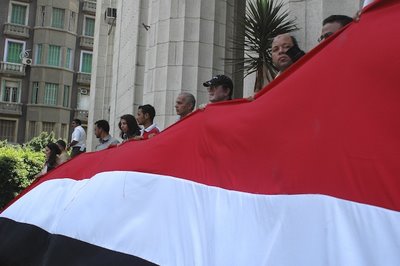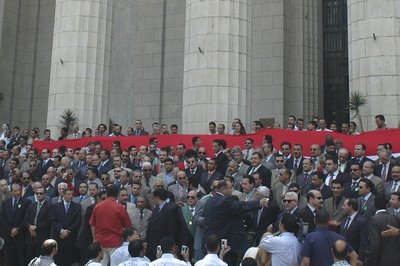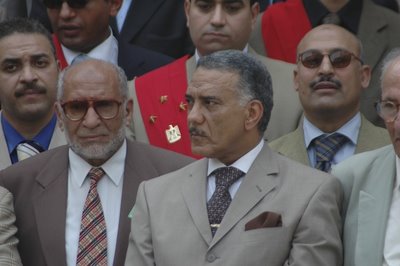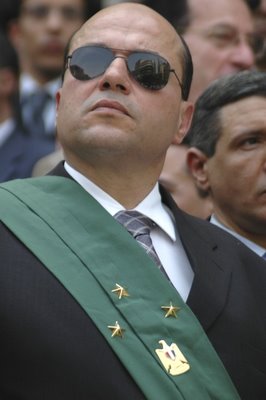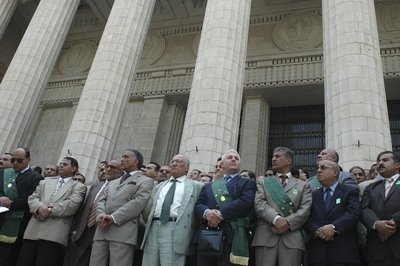It seems like the dust is settling on yet another political 'crisis', and the saga of Judges versus the State is, for now, over. Mahmoud Mekki was acquitted yesterday of the absurd charge of 'disparaging the Supreme Judicial Council'. His partner-in-crime Hisham Bastawissi was merely reprimanded for the same misdemeanour. The verdicts were contrary to what, officially at least, the two pro-reformers expected. Bastawissi, before being struck down by a heart attack on Wednesday, said on Tuesday that he was expecting to be dismissed, and that no negotiations had been undertaken with the SJC.
Last week, I attempted to predict how the regime would steer its way out of this situation, and presented a smart option and a dumb option. The smart option involved making concessions to the judges, acquitting them, and then losing the judicial independence issue within the slothful machinery of state. The dumb option involved making no concessions, and just toughing their way out of it with the help of the security services.
Turns out they did both.
Here's an account of what I witnessed downtown yesterday:

[A security cordon around the high-court prevented protestors getting close enough to be beaten up in front of it]
Having learned from last week’s events that it isn't good for appearances to be beating up protestors in front of the emblem of state justice, the area around the High Court was yesterday totally sealed off. Even High Court staff had difficulty getting to work, and there was little chance that Kifaya! or the Brotherhood were going to be able to show up there. At around 9am an incident had ocurred in Abassiya, and apparently Brotherhood and Kifaya! members had been beaten. Abassiya is a good place for the Central Security Forces (CSF) to kick-off the day’s activities, as the likelihood of journalists being there is slim.
The demonstrators' tactic, in the face of massive police cordons, was to be fluid and pop-up in unexpected places. I met a number of Kifaya! activists who had just returned from a Brotherhood gathering in Galaa street. They then reappeared, about 100-150 of them, where Talaat Harb street runs into the crowded Midan Orabi. As the demo began, with the Islamist slogans and the holding aloft of Qurans (a tactic not favoured by the mid-ranking MB leadership, as it apparently makes them look like fundamentalists) traders hurriedly shut-up-shop, knowing rightly what was coming next. The slogan session lasted about five minutes, and then the baton-charge arrived. A uniformed phalanx pushed the demonstrators back into the square, and then the Biltagiyya were deployed in a pincer movement to beat and drag-off those who hadn't made an escape.

[A Brotherhood member leads demonstrators near Midan Orabi]

[Baton charge]

[Youth employment initiatives in action – Biltagiyya give chase]
The Biltagiyya were relatively few in number, but were wielding truncheons. The protest group rapidly dispersed through the surrounding streets towards Ezbekiyya. Stragglers were dragged off, beaten, kicked and introduced to the back of one of the green meat-wagons. At this point, apparently the police tactic is to remove your mobile phone and ensure that you cannot be seen from the outside. The most vicious beatings reportedly occur inside the trucks used to transport troops to and from downtown.
I followed a small group of mostly Brotherhood members as they attempted to evade the Biltagiyya, and there unfolded a bizarre pursuit through the tiny backstreets of Ezbekiyya. At one point the protestors thought they had gotten away, only to have a surprise attack sprung on them. I saw one feckless individual being dragged away to some unpleasant fate. Over 250 were reportedly arrested during the day.

[Strange pursuit - through the backstreets with Brotherhood fugitives]
Back downtown (the escapees requested that journalists leave them, as they were something of a liability back there) a very stately gathering had been organised by about 20 or so of the Brotherhood's MPs. Making use of their parliamentary immunity, these gentlemen and a small group of sticker-waving Kifaya! activists began to block traffic on Talaat Harb street. The MPs were wearing black sashes that read MPs Are With The Egyptian Judges. The sashes are something of a relatively common feature in political life now, and usually represent some mournful political reality that the wearers are effectively powerless to prevent, such as the extension of Emergency Law last month.

[Brotherhood MPs and Kifaya! members cooperate to block traffic]
It seems as if the heavy artillery of the Brotherhood was wheeled out in support of the Judges just in the nick of time. Essam al-Eryan even made sure that he got himself arrested just to make the point. The Brotherhood make good capital out of this sort of thing, and had the Judges not been acquitted yesterday perhaps the MB would, as was being threatened, have mobilised across the country in response. But perhaps fortunately it doesn't look like it's going to come to that. Because if one thing would make Washington turn a blind eye, and allow the Security thugs to direct brutality with impunity, it would be the large-scale involvement of the Brotherhood.
As the morning turned into early afternoon and tempers began to get shorter on Talaat Harb, I moved down to near the al-Ghad party HQ. In a separate case in the High Court yesterday, their leader Ayman Nour was having his appeal of his fraud conviction rejected. Five years in Jail. Nour came a distant second in last year's Presidential election. Being the dynamo at the centre of a junior party that was of his own making, I wonder if his definite imprisonment now means the end of al-Ghad. Probably.

[The fate of Dr Ayman Nour has, it seems, been sealed]
It is difficult to gauge the ramifications of yesterday's events so soon. The acquittal of the two judges, whose case had become the nexus of all pro-reform and opposition forces, seems to take the wind out of their sails somewhat. It is a limited victory which removes the momentum for real change. That much seems clear. What will happen in terms of legislation to address the concerns of the Judges' Club is anyone's guess. It depends on the mood of the regime and the appetite of Judges for more confrontation. It has to be said that all pro-reform entities have been outplayed. The government has taken a total-war type approach. The physical force element was obvious, and remains a central part of their strategy regardless of EU and US criticism, which is ineffectual bleating at best anyway. The Psy-Ops element has worked well also, intimidating and confusing opponents with alternating silence and threats. And finally the small scraps that the State threw the opposition yesterday in the form of an acquittal and mild punishment might just mean that for the time being, the troublesome protestors will go home, and we go back to business as usual.

